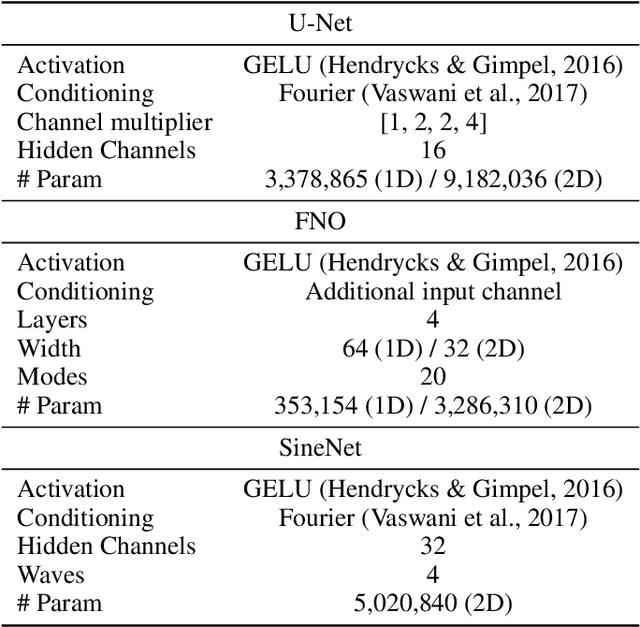Daniel Musekamp
CALM-PDE: Continuous and Adaptive Convolutions for Latent Space Modeling of Time-dependent PDEs
May 19, 2025Abstract:Solving time-dependent Partial Differential Equations (PDEs) using a densely discretized spatial domain is a fundamental problem in various scientific and engineering disciplines, including modeling climate phenomena and fluid dynamics. However, performing these computations directly in the physical space often incurs significant computational costs. To address this issue, several neural surrogate models have been developed that operate in a compressed latent space to solve the PDE. While these approaches reduce computational complexity, they often use Transformer-based attention mechanisms to handle irregularly sampled domains, resulting in increased memory consumption. In contrast, convolutional neural networks allow memory-efficient encoding and decoding but are limited to regular discretizations. Motivated by these considerations, we propose CALM-PDE, a model class that efficiently solves arbitrarily discretized PDEs in a compressed latent space. We introduce a novel continuous convolution-based encoder-decoder architecture that uses an epsilon-neighborhood-constrained kernel and learns to apply the convolution operator to adaptive and optimized query points. We demonstrate the effectiveness of CALM-PDE on a diverse set of PDEs with both regularly and irregularly sampled spatial domains. CALM-PDE is competitive with or outperforms existing baseline methods while offering significant improvements in memory and inference time efficiency compared to Transformer-based methods.
Active Learning for Neural PDE Solvers
Aug 02, 2024



Abstract:Solving partial differential equations (PDEs) is a fundamental problem in engineering and science. While neural PDE solvers can be more efficient than established numerical solvers, they often require large amounts of training data that is costly to obtain. Active Learning (AL) could help surrogate models reach the same accuracy with smaller training sets by querying classical solvers with more informative initial conditions and PDE parameters. While AL is more common in other domains, it has yet to be studied extensively for neural PDE solvers. To bridge this gap, we introduce AL4PDE, a modular and extensible active learning benchmark. It provides multiple parametric PDEs and state-of-the-art surrogate models for the solver-in-the-loop setting, enabling the evaluation of existing and the development of new AL methods for PDE solving. We use the benchmark to evaluate batch active learning algorithms such as uncertainty- and feature-based methods. We show that AL reduces the average error by up to 71% compared to random sampling and significantly reduces worst-case errors. Moreover, AL generates similar datasets across repeated runs, with consistent distributions over the PDE parameters and initial conditions. The acquired datasets are reusable, providing benefits for surrogate models not involved in the data generation.
Vectorized Conditional Neural Fields: A Framework for Solving Time-dependent Parametric Partial Differential Equations
Jun 06, 2024



Abstract:Transformer models are increasingly used for solving Partial Differential Equations (PDEs). Several adaptations have been proposed, all of which suffer from the typical problems of Transformers, such as quadratic memory and time complexity. Furthermore, all prevalent architectures for PDE solving lack at least one of several desirable properties of an ideal surrogate model, such as (i) generalization to PDE parameters not seen during training, (ii) spatial and temporal zero-shot super-resolution, (iii) continuous temporal extrapolation, (iv) support for 1D, 2D, and 3D PDEs, and (v) efficient inference for longer temporal rollouts. To address these limitations, we propose Vectorized Conditional Neural Fields (VCNeFs), which represent the solution of time-dependent PDEs as neural fields. Contrary to prior methods, however, VCNeFs compute, for a set of multiple spatio-temporal query points, their solutions in parallel and model their dependencies through attention mechanisms. Moreover, VCNeF can condition the neural field on both the initial conditions and the parameters of the PDEs. An extensive set of experiments demonstrates that VCNeFs are competitive with and often outperform existing ML-based surrogate models.
 Add to Chrome
Add to Chrome Add to Firefox
Add to Firefox Add to Edge
Add to Edge